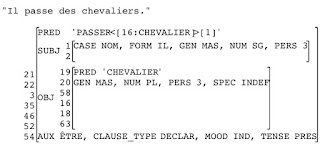University of Zurich, Switzerland
University of Vienna, Austria
University of Frankfurt am Main, Germany
University of Heidelberg, Germany
University of Bonn, Germany
University of Freiburg, Germany
University of Konstanz, Germany
Institute of German Language (IDS), Mannheim
Lexical-Functional Grammar
Additional information and materials relating to the following book:
Christoph Schwarze and Leonel F. de Alencar. 2016. Lexikalisch-funktionale Grammatik. Eine Einführung am Beispiel des Französischen mit computerlinguistischer Implementierung (Lexical-Functional Grammar: A French-based Introduction with Computational Implementation). Tübingen: Stauffenburg. X, 271 pp. Stauffenburg Einführungen, 30. ISBN 978-3-95809-411-6.
sexta-feira, 23 de dezembro de 2016
quinta-feira, 7 de abril de 2016
Errata
On page 63, example (47), the list of GOVERNABLERELATIONS should include OBJ2. The corrected line reads:
GOVERNABLERELATIONS SUBJ OBJ OBJ2 OBL XCOMP.
On page 63, example (48), rule "R2" is incorrect. The realization of a PP as an OBJ2 is missing. This rule should read:
"R2" VP --> V' (NP: (^ OBJ)=!) (PP: { (^ XCOMP)=! | (^ OBJ2)=! | (^ OBL)=!}) (AP: (^ XCOMP)=!).
On page 143, the 4th parameter of the template call in the first line of example (55) should be "À" instead of "DE". The corrected line reads:
demande V * { @(DIRECTIVE DEMANDER OBJ2 À) |
On page 251, the word "épelées" in example (57) is incorrect. This example should read:
(57) Le chevalier mange les pêches que la fée a pelées.
GOVERNABLERELATIONS SUBJ OBJ OBJ2 OBL XCOMP.
On page 63, example (48), rule "R2" is incorrect. The realization of a PP as an OBJ2 is missing. This rule should read:
"R2" VP --> V' (NP: (^ OBJ)=!) (PP: { (^ XCOMP)=! | (^ OBJ2)=! | (^ OBL)=!}) (AP: (^ XCOMP)=!).
On page 143, the 4th parameter of the template call in the first line of example (55) should be "À" instead of "DE". The corrected line reads:
demande V * { @(DIRECTIVE DEMANDER OBJ2 À) |
On page 251, the word "épelées" in example (57) is incorrect. This example should read:
(57) Le chevalier mange les pêches que la fée a pelées.
terça-feira, 15 de março de 2016
quarta-feira, 3 de fevereiro de 2016
Parse examples
Example structures generated by the book's French grammar
Along the 8 chapters of the book, the implementation of a computational grammar of French in the LFG/XLE formalism is explained step by step. Here are some example f-structures and c-structures generated by the XLE parser from the book's final grammar fragment.
quinta-feira, 21 de janeiro de 2016
How to buy the book
The book can be ordered directly from Stauffenburg Verlag:
http://www.stauffenburg.de/asp/books.asp?id=1356
http://www.stauffenburg.de/asp/books.asp?id=1356
sexta-feira, 15 de janeiro de 2016
New LFG book's description
Reference
Christoph Schwarze and Leonel F. de Alencar. 2016. Lexikalisch-funktionale Grammatik. Eine Einführung am Beispiel des Französischen mit computerlinguistischer Implementierung (Lexical-Functional Grammar: A French-based Introduction with Computational Implementation). Tübingen: Stauffenburg. X, 271 pp. Stauffenburg Einführungen, 30. ISBN 978-3-95809-411-6.Abstract
Lexical-Functional Grammar (LFG) is a well-established formalism for writing grammars of any natural language. Being explicit, LFG grammars can be implemented on the computer, which makes it possible to impartially test grammatical analyses against large amounts of data.
To profit from the LFG formalism's amenableness to empirical testing, this Introduction combines grammatical analysis with its
implementation. It introduces the LFG model step by step, simultaneously
developing increasingly complex computational grammar fragments of French.
These fragments are implemented in the Xerox Linguistic Environment (XLE), the
state-of-the-art grammar development tool for the LFG formalism. The book also
shows how word tokenization and inflectional morphology may be implemented in
terms of Finite State Morphology using the Xerox Finite State Tools (XFST) and
how they may be integrated into the XLE French grammar fragment. No previous
knowledge of XLE or XFST is assumed; formal devices and techniques are
gradually explained in the course of the book's 8 chapters. All XLE and XFST
grammar code, test sets, scripts, etc. from the book will soon be freely
available for download on Github at https://github.com/lfg-french-grammar/book.
The book addresses crucial topics of French syntax, such as agreement,
the subject clitic, the adjective, prepositions, determiners, sentential
complements, infinitives and control verbs, the passive, auxiliary selection
in compound tenses, as well as a fragment of verb inflection, including stem
variations induced by the orthography. Apart from its use as an introductory
textbook or self-study manual for LFG or for French syntax from a
lexical-functional perspective, the book can be used as well as an introduction
to grammar development with XLE and Finite-State Morphology with XFST.
Intended users are
students of computer science, natural language processing, and computational
linguistics on the one hand, and of theoretical linguistics or Romance
linguistics on the other. The text is in German, but all LFG, XLE and XFST
rules and representations are conform to the English-based, international
usage.
Keywords: Computational Linguistics, Computational Syntax, Computational Morphology, Finite-State Morphology, Generative Syntax, Generative Grammar, Lexical-functional Grammar, French Grammar, French Syntax
Keywords: Computational Linguistics, Computational Syntax, Computational Morphology, Finite-State Morphology, Generative Syntax, Generative Grammar, Lexical-functional Grammar, French Grammar, French Syntax
About the authors
Christoph Schwarze taught Romance Linguistics at the Department of Linguistics of the
University of Konstanz, Germany.
Leonel Figueiredo de Alencar teaches German linguistics at the Department of Foreign Languages and Literatures, and computational linguistics at the Graduate Program in Linguistics of the Federal University of Ceará in Fortaleza, Brazil. He is also collaborator researcher at the Group of Computer Networks, Software Engineering, and Systems (GREat).
Leonel Figueiredo de Alencar teaches German linguistics at the Department of Foreign Languages and Literatures, and computational linguistics at the Graduate Program in Linguistics of the Federal University of Ceará in Fortaleza, Brazil. He is also collaborator researcher at the Group of Computer Networks, Software Engineering, and Systems (GREat).
Assinar:
Comentários (Atom)






